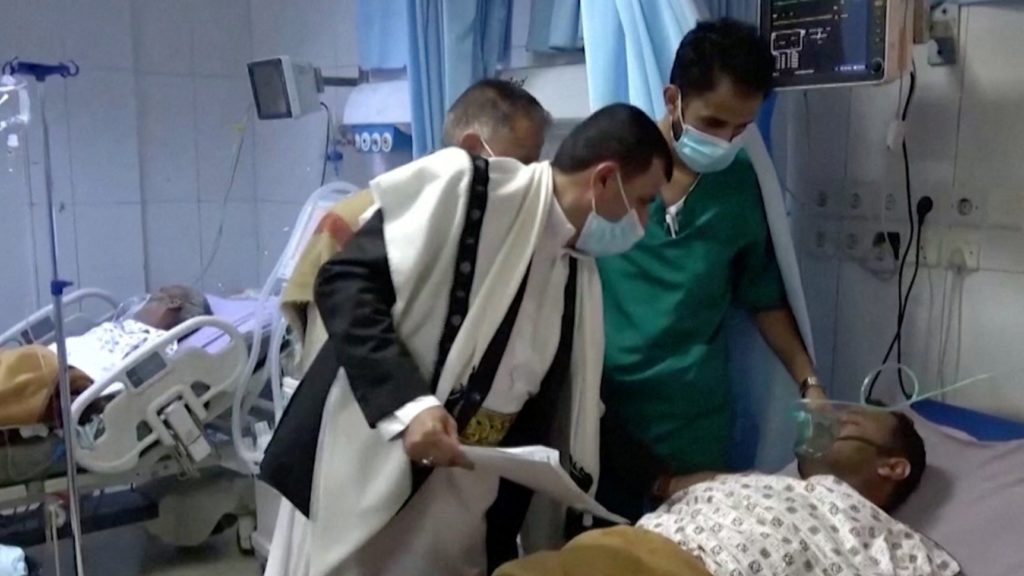Eid al-Fitr celebrations began April 21 as Muslims across the globe celebrated the completion of Ramadan, the month of fasting and prayer. But for the Yemeni population, experiencing what the U.N. calls the worst humanitarian crisis in the world, the feast has been marked by yet another tragedy.
At least 85 people were killed in a crowd surge in Sana’a, the capital of Yemen, April 19 as needy residents in the war-torn nation flocked to receive charity handouts from local merchants.
Children were among the casualties. In all, 322 people were injured, 50 of them seriously. The Houthi rebels who control the capital arrested three businessmen over the incident. But some claim the ruling Houthis want to control aid distribution, and witnesses quoted by the Guardian said panic was sparked while gunshots were fired by the Houthis close to the crowd.
"My heartfelt condolences go out to all Yemenis grieving today, and I wish the injured a speedy recovery," Hans Grundberg, the U.N. special envoy for Yemen, said as quoted by the Guardian.
"We are experiencing a great tragedy. A large number of our citizens have died during this stampede," said Abdulaziz Bin Habtour, the prime minister of the Houthi movement.
According to Reuters, hundreds of people had crowded into a school to receive donations of about $9.
"People gathered imagining they would come back to their homes with a tiny bit of happiness for their kids, but never returned," Saba Hamzah, a Yemeni scholar, told the Guardian.
At the end of the month of Ramadan, people start giving away Zakat al-Fitr, or the Zakat of Breaking the Fast of Ramadan, to people who are in need. In Yemen, most of the population have close to nothing, with 80% of the population in need of humanitarian help.
Radoslaw Sterna is a head of mission of Caritas Poland in Yemen and has worked in the country since August 2022.
"Yemen is a country that is even hard to define. It is combined of many dialects, many regions and is controlled by three different forces," Sterna told OSV News. But above all, the country is torn internally and externally by a nine-year conflict as Iran and Saudi Arabia fight for influence in the region.
While ongoing war and loss of life seems to be enough tragedy for the people, Yemenis also suffer from the lack of access to medical aid. "Half of the hospitals are out of service," Sterna said. Caritas Poland finances five outpatient clinics in the south of the country. "We pay salaries to medical personnel so that they can provide care to the people."
According to UNICEF, across Yemen, 2.2 million children are acutely malnourished, including nearly more than a half-million children facing severe acute malnutrition, a life-threatening condition. In addition, around 1.3 million pregnant or nursing mothers are acutely malnourished.
According to Caritas Poland, out of 32 million people in Yemen, 19 million are food insecure, and 6 million face hunger.
"When the Western world struggled with COVID-19 pandemic, Yemen was facing a malaria and cholera epidemic. Then all attention went to the war in Ukraine and its suffering residents. The war in Ukraine hit Yemen with soaring prices of flour and wheat products -- in the stores I pay pretty much the same prices as in Europe -- and people make $200-$300 a month," Sterna told OSV News.
In 2022, Caritas Poland was able to provide medical help to 45,000 people, hoping the number will reach 60,000 in 2023. "It is a drop in the ocean of needs, but still, it is lifesaving," Sterna said.
Wegdan Salem, a mother of four little children escaped Al-Hudaydah rebel-held province and now lives in Fokam in southern Yemen. "We live on daily rates received by my husband," she told Caritas Poland. "We live in the area only because there is an outpatient clinic we can go to. It is our lifebuoy. We are really grateful for that help," she said.
She note only gets the possibility of visiting the doctor, but also receives medicine and can get specialized tests.
Caritas estimates that 8.1 million women need gynecological care in Yemen, including 200,000 women who need lifesaving treatment around labor.
Ghadah Muhammad Abu Bakr Bazarah is a doctor who has worked in the Fokam clinic since 2009. "We try to prevent the deaths of mothers around labor. It was a great help when Caritas trained a group of midwives that help women deliver their babies at home," she told Caritas Poland.
"The situation of the Yemeni people is forgotten by many in the world. And it cannot be forgotten," Sterna said. "People in Yemen are at the limit of their endurance, and the situation in Sana'a with dozens killed in the crowd surge only proves that," he told OSV News. "For me, the most important thing is to remember the suffering of the Yemeni people."

